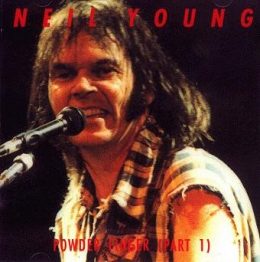Four Classic Rock Songs for the Dissident Right
Posted By Spencer J. Quinn On In North American New Right | Comments DisabledLike a lot of people in Generation X, I grew up on rock music, especially classic rock. I still love the stuff. Despite this, I predict that most classic rock will prove increasingly irrelevant to the Dissident Right as we tilt our spears deeper into the twenty-first century. But isn’t this a little counter-intuitive?
The Dissident Right is defined by its rebellious stance, and wasn’t rock and roll also a form of rebellion? Wouldn’t at least some rock music hold meaning in modern dissident culture since both find themselves on the wrong side of the status quo? I would argue not at all. This similarity is specious at best.
In a sense, it was the precursors of today’s Dissident Right which rock and roll initially rebelled against—for example, the traditionalists, conservatives, race realists, patriots. Squares, basically. Rock and roll was not for squares, and its uninhibited (and often sexual) energy served only to alienate those squares simply because they chose not to degenerate along with the times. Despite this antithetical relationship, however, I would like to offer four classic rock songs that will likely outlive the rock era and provide comfort and inspiration for rightist dissidents in years to come.
Here are my parameters.
- Beyond its already high quality, the song must address dissident themes. High quality alone will not make the cut. For example, “God Only Knows” by the Beach Boys or “Hello Goodbye” by the Beatles are beautiful rock songs that may survive for centuries, but still won’t have any more meaning to dissident movements than, say, an equally beautiful string quartet by Haydn.
- The song must be able to address the existential concerns of the Dissident Right without completely reversing the artist’s original intent. “Fortunate Son” by Credence Clearwater Revival pounds with rebellion in every note and is a cracking great rock song. Nonetheless, it is so rooted in Vietnam War protest and neo-Marxist class struggle that one would have to pervert its meaning entirely in order to make it make sense to the Dissident Right.
- The songwriters don’t have to like us. Most of them are still living, and I’m sure they would be appalled to see their work appear on a list like this one. But we shouldn’t care about that. One day they will be gone, but our movement will endure.
- The song must be classic rock—so excluded genres include country, heavy metal, hardcore punk, and pretty much everything these genres gave rise to. This is partially due to my lack of affinity to such genres. And ignorance. Don’t forget ignorance. Man can’t write about everything.
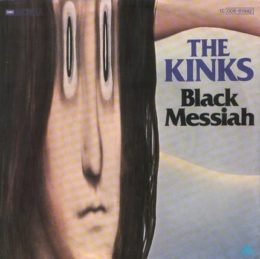 [2]Song #1: “Black Messiah [3]” by the Kinks, 1978
[2]Song #1: “Black Messiah [3]” by the Kinks, 1978
(Adapted from my article of the same name [4] from June 2016)
This song is so overtly race-realist that I am shocked that it could ever appear on a record by a band as mainstream and popular as the Kinks. It starts with a defensive plea:
Everybody got the right to speak their mind
So don’t shoot me for saying mine
Note the high stakes here. Songwriter Ray Davies is telling us that someone might shoot him for speaking his mind. Recently Greg Johnson was arrested in Norway not for something he said, but for something he might say. Shortly before that, violent Antifa thugs prevented him from speaking at the Scandza Forum in Copenhagen. So, right away this is a relevant song for the Right.
It continues:
Everybody talk about racial equality
Everybody talk about equal rights
But if I told you that God was black…
What would you think of that?
I bet you wouldn’t believe it.
After the Age of Obama and his mulatto kleptocracy, I can believe it.
There’s a self-made prophet living right next to me
He says the Black Messiah’s gonna come and set the whole world free
He looked at me with his evil eye
And he prophesied.
And he really believed it.
He said a Black Messiah
Is gonna set the word on fire.
And he no lie-a
Cause he has truly heard the word.
By calling this prophet ‘self-made’ and referring to his ‘evil eye,’ clearly we are not supposed to take him very seriously. Now, here’s the kicker in which our narrator identifies as white and shares his (completely different) side of the story:
Everybody talk about racial equality
But I’m the only honkie living on all black street
They knock me down
Cause they brown
And I’m white
Like you wouldn’t believe it.
I’m sure a white liberal wouldn’t believe it. It seems our narrator is speaking to a white liberal, trying to tell him how things really are: that blacks are racist and violent and tend to target white people with their crimes. Then we have this:
Everybody talk about racial equality
Everybody talk about equal rights
But white’s white and black’s black.
And that’s that.
So what is this supposed to mean? It means that blacks and whites are different and there is nothing anyone can do about it. Not education. Not social engineering. Not public welfare. Not affirmative action. Absolutely nothing. “And that’s that.” Later in the song, Davies doubles down on this race business and says, “And that’s the way you should leave it.”
Yes! I agree. We should leave it. The fact that racial differences are real is a big reason why blacks belong in their countries, and whites in theirs—a central tenet of the Dissident Right.
But it’s not just the lyrics that make this song so relevant. It’s the music as well. It is a catchy, if somewhat indolent, reggae number. Yes, reggae. The song uses black music to be critical of black people from a race-realist perspective. It would be like Eric Clapton writing a blues number about how black people can’t help but steal and have illegitimate children. That would be pretty shocking, wouldn’t it? Only “Black Messiah” is even more so given that the Kinks weren’t exactly known for reggae.
But there’s more. Incredibly, as if to double down on its negrophobia, the song then slides effortlessly, seamlessly, into Dixieland jazz! A whole horn section in glorious improvisation. What pop song goes from reggae to Dixieland and back again? It is truly one of the most delightful and surprising moments in all of rock music. Ray Davies could have written this song about his Aunt Minnie’s buttermilk biscuits, and this transition alone would still have made the song marvelous. But the fact that he skewers blacks with a second genre of their music speaks worlds for what he thinks of a black messiah. It’s like he’s going into enemy territory, fighting them on their own terms, and winning. “Black Messiah” inspires me every time I hear it.
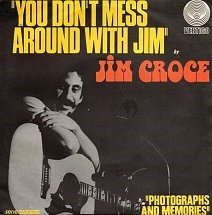 [5]Song #2: “You Don’t Mess Around with Jim [6]” by Jim Croce, 1972
[5]Song #2: “You Don’t Mess Around with Jim [6]” by Jim Croce, 1972
(Adapted from my “A Dissident Remembers Jim Croce” [7] essay from February 2019)
With acoustic guitar and piano ominously prickling the edges of this thumping folk-rock number, “You Don’t Mess Around with Jim” evokes a timeless mythology of fighting men and a world in which strength, stature, prowess, and reputation serve to extend a man’s power over other men. Crucial to this narrative is the promise of the showdown. Think Achilles and Hector, Sanger Rainsford and General Zaroff, Holmes and Moriarty, Gary Cooper in High Noon, Batman and Bane.
Just like Croce’s smash hit, “Bad, Bad Leroy Brown,” “You Don’t Mess Around with Jim” [8] transcends genre and can be applied anywhere and at any time—Club-wielding cavemen, Japanese samurais, dueling officers, barbarian warlords, feuding Khans, it all fits—as long as you have aggressive men with not enough resources to go around (and yes, in this case, women are resources). In this song, an alpha male gets a little too full of himself and has to face a challenge from a determined rival. The encounter is primal and bloody, and there is only one winner. For Leroy Brown, the dispute is over a woman. For Big Jim Walker it’s over money. Can’t get more universal and masculine than that—and the stakes couldn’t be higher.
The story begins on 42nd Street in New York City where Big Jim Walker, pool hustler extraordinaire, rules the roost. We don’t get a clear read on the man’s race. He could be black, he could be white. Croce descends into a bit of Ebonics in this song, so you be the judge:
Yeah, he big and dumb as a man can come
But he’s stronger than a country hoss
And when the bad folks all get together at night
You know they all call big Jim “Boss”
Yeah, I’d like to think of him as black.
Then enter Willie “Slim” McCoy, whom Walker had recently hustled. McCoy says he wants his money back but he really wants something more. What follows is one of my all-time favorite verses in pop music:
Well, outta south Alabama come a country boy
He say I’m lookin’ for a man named Jim
I am a pool-shootin’ boy
My name is Willie McCoy
But down home they call me Slim
Yeah, I’m lookin’ for the king of 42nd Street
Drivin’ a drop top Cadillac
Last week he took all my money
And it may sound funny
But I come to get my money back
And everybody say, Jack, don’t you know
And you don’t tug on Superman’s cape
You don’t spit into the wind
You don’t pull the mask off that old Lone Ranger
And you don’t mess around with Jim
Two clues point to the fact that Willie McCoy is indeed white. One, he’s from south Alabama, which is about as redneck and as deep into the former Confederacy as you can get. And two, Croce calls McCoy a “country boy.” Yes, blacks do live in the Alabama countryside, but the expression “country boy,” as in “A Country Boy Can Survive” by Hank Williams, Jr., typically refers to a white guy, not a black one.
So when looking only at the text, “You Don’t Mess Around with Jim” can be seen as a fight between a white and a black. And the white wins.
What does McCoy really have on his mind when he walks into Big Jim’s pool room? Nothing less than murder. He wants to get back what’s his and leave Jim in pieces on the floor. This is essentially what happens, and I love how Croce describes it:
And when the cuttin’ was done
The only part that wasn’t bloody
Was the soles of the big man’s feet
“You Don’t Mess Around with Jim” should hold special meaning for the Dissident Right because it parallels the white experience vis-à-vis the Left and the hordes of non-whites currently invading the West. We had something great once. It got hustled from us by criminals, frauds, and liars. And now we want it back. I predict that the current culture wars will culminate in a bloody fight which will closely resemble the fight scene in this song. Whites will wake up and realize that they will have no choice but to fight in order to regain what they once had.
And when that happens, every single one of us should become Willie McCoy and arm ourselves with the words of Jim Croce:
Well, outta south Alabama come a country boy…
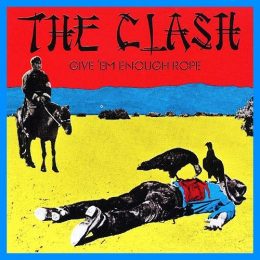 [9]Song #3: “Safe European Home [10]” by the Clash, 1978
[9]Song #3: “Safe European Home [10]” by the Clash, 1978
A single snare shot announces the beginning of this insanely catchy rocker. In musical terms, “Safe European Home” rocks about as hard as possible while remaining within the classic rock genre. Fast, electric, yet melodic with sing-songy backing vocals, this song ironically pines for peace and tranquility. The lyrics are hard to catch but basically tell the story of a man who spends time in the third world and is thrilled to return to his “safe European home.” Things, apparently, were not so great outside of Europe.
I went to the place where every white face
Is an invitation to robbery
And sitting here in my safe European home
Don’t wanna go back there again
So returning to the ethnocentricity expressed in “Black Messiah,” we have a song the perspective of which verifies anti-white behavior among non-whites. Whites are basically suckers for being around them since the non-whites in question are only looking to rob them in one way or another. It is also safe to assume that these non-whites are indeed black since singer and co-songwriter Joe Strummer hints that “Natty dread drinks at the Sheraton Hotel.”
He also delivers this quite telling stanza which settles all the doubt:
They got the sun and they got the palm trees
They got the weed, and they got the taxies
Whoa, the harder they come and the home of the bluebeat
Yes, I’d stay and be a tourist but can’t take the gun play.
The Harder they Come is a Jamaican crime movie from 1972—the soundtrack of which became an iconic reggae album in its own right. Further, “bluebeat” is a form of West Indian pop music from the 1960s. So Strummer is talking about blacks, specifically Jamaican blacks, whose penchant for “gun play” was well known even back in 1978.
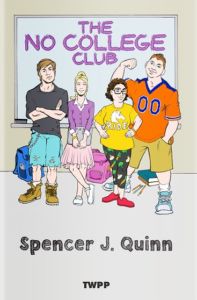 [11]
[11]You can buy Spencer J. Quinn’s young adult novel The No College Club here [12].
And all he wants to do is get away from them. What could be more Dissident Right than that?
The outro of “Safe European Home” is both prophetic and terrifying. It runs for about a minute and a half with dueling vocals pitting variations of “Rudie can’t fail” versus variations of “European home.” “Rudie Can’t Fail” is a later song by the Clash appearing on 1980’s London Calling, with “rudie” most likely referring to Jamaican “rude boys”—punks basically. Where in “Rudie Can’t Fail,” it’s ambiguous whether the “can’t fail” line is ironic, in “Safe European Home” it comes off as a threat. In the hindsight afforded to us after forty years, we can interpret it no other way.
“Rudie come from Jamaica,” Strummer tells us. We’re no longer in the West Indies. We’re back in Europe, and rude boys come follow us home, see? As Strummer chants repetitively about Rudies shooting and looting and not failing, co-writer Mick Jones reminds us of the song’s title, stretching out “European home” over Strummer’s increasingly spastic vocals. It’s hard to decipher what Jones is saying about his European home. But clearly, the themes are competing, with Jones hollering out “Explosive European home!” towards the end of the song.
Apparently, Europe is not so safe after all. By predicting the failure of multiracialism and mass third world immigration, “Safe European Home” has become nothing less than a clarion call for European whites to remember how safe their homes used to be before the rude boys moved in. If you listen carefully, you’ll find that whenever the song’s title is sung, Jones sings it together with Strummer, adding a rough harmony to the lyric. It reminds us that a home is not just for one person. Homes are for families and for nations, and these homes are now under dire threat. As a powerful, churning rocker, “Safe European Home” can only inspire us to one day take our homes back.
Song #4: “Powderfinger [13]” by Neil Young, 1979
The blackest of all black pills, “Powderfinger” represents one of the few moments of great genius in the rock era—and perhaps one of the last great gasps of Western music. A searing electric live number, there’s really nothing like it. With its driving beat and several jagged, sub-virtuosic guitar solos, the song is recognizably rock, but its harrowing story and spectral narration makes it so much more. “Powderfinger” embodies a nihilism of historic proportions, something that makes a joke out the work of Young’s dourest contemporaries. Lou Reed at his best could portray the chilling desolation of a fallen world (“Heroin,” “Street Hassle”). Bruce Springsteen is unparalleled at depicting a man’s descent into such a world (“Stolen Car,” “State Trooper”). But these are personal impressions of individual characters. Poignant and moving, yes, but limited when compared to the apocalyptic conflict in “Powderfinger.” Perhaps the Rolling Stones’ “Jumpin’ Jack Flash” approaches its Faustian scope. But it’s too allegorical, too fantastic in my opinion to compete.
Young’s song gives us an abundance of personal impressions, told from the perspective of a young man who has just emerged from childhood and hasn’t had the time to grapple with the issues plaguing the characters above. He himself is not slipping into that fallen world like Lou Reed’s drug dealers or Springsteen’s car thieves. No, the world has already fallen, and this innocent young man, not even in his prime of life, is going down with it. Therein lies the unspeakable tragedy of “Powderfinger.”
The story seems simple and takes place entirely in a few seconds, but you can practically reach your arms between the lines—and God knows what you’ll find. Our protagonist is a member of a family or clan that is, for unknown reasons, at odds with authority. He spots a gunboat coming down the river and notes wryly that “it don’t look like they’re here to deliver the mail.” His father is dead and he realizes that there are no elder men around to deal with this crisis.
So the powers that be left me here to do the thinkin’
And I just turned twenty-two
I was wondering what to do
And the closer they got
The more those feelings grew.
Then Young unloads what might the most terrifying lyrics in rock:
Daddy’s rifle in my hand felt reassuring
He told me red means run, son. Numbers add up to nothing.
What does that even mean? The boat’s beacon is red. It has numbers on its side. Could that be it? Or is this an us-versus-them thing? As in, they outnumber us. And “red means run”—what is that? Could it be the red of blood, the blood of battle? Was the old man imparting the futility of fighting to his son? If so, then why does his rifle feel so reassuring? Does the boy want to die?
But when the first shots hit the dock, I saw it coming
Raised my rifle to my eye
Never stopped to wonder why
Then I saw black
And my face flashed in the sky
So that’s it. The boy is shot. The boy is dead. But his story isn’t. We know because he keeps telling it.
Shelter me from the powder and the finger
Cover me with the thought that pulled the trigger
Think of me as one you’d never figure
To fade away so young
With so much left undone
Remember me to my love, I know I’ll miss her
Young waits until the very last line to disclose a sense of loss—just a simple and plain reference to romantic love in the face of oblivion. Any more I think might have been corny—anything less would have been incomplete. But it’s the first two lines of this last stanza which are the most devastating for me. By “powder” (as in gunpowder) and “finger,” he’s clearly referring to the man on the gunboat who had just killed him. But why is our hero asking for shelter now that he’s dead? Isn’t it a little late for that? Or maybe he’s referring to his memory in the minds of others? Or perhaps it’s something otherworldly? And “cover me with the thought that pulled the trigger” . . . could there be any greater embrace of defeat? Where he could have called for his surviving family members to sound an alarm or organize a defense or somehow prove his sacrifice that not been in vain, instead he wants the reason for his death to “cover” him. As in to bury? As in to hide? Who knows? But what we do know is this young man’s precocious sense of fatalism lives on after he’s dead.
Like nothing else, this song hurts.
And why does he have such fatalism? Because of who is he is and what he represents and how for him and his kind, time has run out. The dissident theme of “Powderfinger” is strong up until this point, but since it is cut in blood and soil, we see how easily it can be applied specifically to the struggles of dissidents on the Right. First, there is no mention of rebellion or organized warfare. This is peacetime, and despite the hillbilly character of our hero and family, the South is not about to rise again. Second, Young also does not mention any criminal behavior which would cause the Man to come bearing down on these people. Any talk of bootlegging liquor or growing cannabis or the letters “DEA” on the side of the boat would make the song little more than a precursor to “Copperhead Road” by Steve Earle with its considerably less profound (yet not insignificant) meaning. Finally, Young offers no indication of why that gunboat is coming after these people except that it is because they are these people—it is because of our hero’s blood and familial relations with Mama and Dad and his brother and Big John and Annie Lou and his unnamed love. These are enemies of the state not for any ideology but for who they are.
Yes, “Powderfinger” does not overtly or covertly mention race like the previous songs do. But what is race other than extended ties of blood? A non-racial, non-dissident interpretation of the song can suggest the inevitability of primordial man being mangled in the relentless gears of Progress. There’s certainly some validity in this. But for the purposes of the Dissident Right, the door opens for a much deeper and more chilling interpretation.
This is the future of the white race. If we continue down the path we’re on with mass immigration and multiracialism, the only outcome for whites is oblivion. And “Powderfinger” depicts quite evocatively what that oblivion would be like—a despised minority living entirely at the whim of a hostile and malicious state which seeks its ultimate eradication. Things have gotten so bad that resistance becomes at best romantic and at worst utterly meaningless. Think of the 25,000 Zoroastrians trying to survive among 82 million Muslims in Iran. Think of 11 million Uighurs being swallowed up by over a billion Chinese. Think of the Don Cossacks and Russian Old Believers and the Ukrainian Kulaks whom the Soviets massacred or starved or march into gulags by the millions. Think of the Emims, a Biblical people once “great, and many, and tall” that had already faded into misty legend by the time of Deuteronomy.
Is this what we want? Yet whether or not we want it, this is what we’re gonna get if we, as whites, don’t do something about it now. “Powderfinger” should serve as the greatest cautionary tale of them all. If we take it’s meaning to heart today perhaps we will dodge a bullet tomorrow, unlike the tragic hero of the song.
 [14]
[14]
